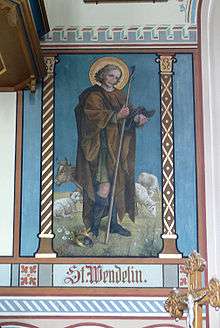Wendelin of Trier

Saint Wendelin of Trier (Latin: Vendelinus; c. 554 - c. 617 AD) was a hermit and abbot. He is venerated in the Eastern Orthodox and Roman Catholic Churches.
Life
There is very little definite information about this saint; his earliest biographies (two in Latin and two in German), did not appear until after 1417. The name "Wendelin" means "wanderer" or "pilgrim" in Old High German. The biographies state that Wendelin was the son of a Scottish king who led a pious life as a youth before leaving his home in secret to make a pilgrimage to Rome. On his way back he settled as a hermit at Westrich in the Diocese of Trier. He entered the service of a wealthy landowner as a herdsman after he was criticized for his idle life, but a miracle led the landowner to allow him to return to his solitude.
Wendelin then established a company of hermits from which sprang the Benedictine Abbey of Tholey in Saarland. He was consecrated abbot in approximately 597, according to the later legends, while Tholey was apparently founded as a collegiate body about 630. It is difficult to say how far the later biographers are trustworthy.
Death and veneration
Wendelin was buried in his cell, and a chapel was built over the grave and the small town of Sankt Wendel grew up nearby. The saint's intercession was considered powerful in times of pestilence and contagious diseases among cattle. When in 1320 a pestilence was checked through the intercession of the saint, Baldwin, Archbishop of Trier had the chapel rebuilt. Baldwin's successor, Bohemond II, built the present beautiful Gothic church, dedicated in 1360, to which the saint's relics were transferred. Since 1506 they have rested in a stone sarcophagus.
Wendelin is the patron saint of country people and herdsmen and is still venerated in Germany, Austria, Switzerland and South Africa. Saint Wendelin is not mentioned in the Roman Martyrology, but his feast is observed in the Diocese of Trier on 22 October.
Iconography
He is represented in art as either a youth or a bearded man, with a shepherd's bag and a book in one hand and a shepherd's crook in the other. He is often pictured with feeding lambs, cattle, and swine, while a crown and a shield appear at his feet.
Legends
The story is told that when Wendelin was working as a herdsman he often took his flock to a mountain to pray there in silence. One time his master came upon him there and was angry because he could not imagine that Wendelin had time to get the flock home before sunset. However, when the master arrived home he discovered the shepherd and his flock already there. Realizing that this was a miracle from God he granted Wendelin his greatest desire and built him his own hermit cell in the vicinity of the farm.[1]
References
- ↑ Bistum Münster. "Heiliger Wendelin (Wendalinus)". Retrieved October 1, 2012.
External links
![]() Media related to Saint Wendelin at Wikimedia Commons
Media related to Saint Wendelin at Wikimedia Commons